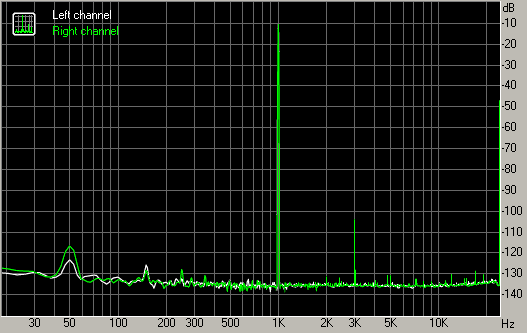Some time ago, I found some very interesting web sites describing several modifications to a D/A converter board, which made it easy to add digital inputs to the preamplifier I was building:
Lampizator -Added a tube section to the output
Jackenhack - Modifications to the output opamp section
After reading these websites, I decided to buy one myself. The DAC is complete mounted kit at a price of $70, including:
- Transformer
- Supply board (5V digital, -12V, +12V analog)
- DAC board
- RCA Connectors
- Cabling
The DAC board uses the famous CS8416 receiver chip. The DAC chip is the CS4397 chip which has a differential voltage output. An opamp stage buffers and transforms the differential output and applies some filtering.
Measurements
Unmodified
First thing to do was to measure the unmodified DAC with my E-MU 1212m sound card using RMAA. The DAC measures quite well, much better than I expected. The noise level is really low. The frequency response shows some irregularities in the high-frequency region, which needs attention later on:

The THD at 0.0021% is not bad, but will be improved.

Complete results of the unmodified DAC can be found here.
Exchanged OPA2134 opamp and removed Philips chip
The standard kit uses a NE5532 opamp, which I figured, could easily be replaced with a high quality opamp. I had some OPA2134 opamps available, which have a JFET input stage, resulting in a very low DC-offset. That is useful as I intended to remove the output capacitors later on. Furthermore, the board is equipped with a Philips chip at the bottom of the pcb. I could not exactly figure out, what the use of it would be, but decided it would probably not be needed anyway, so I removed it. The major thing to note is that the THD decreased somewhat, but nothing spectacular.

Complete RMAA results can be found here.
Output capacitors removed
The output smd elco's were removed. Furthermore I did some simulations on the used opamp stage to see where the dip in frequency response came from. After that, I figured all the 1nF smd capacitors were not needed, as they result in amplification at approximately 35 kHz, which can make the opamp unstable (which is prevented by the 56pF capacitor in the feedback loop). I removed these caps from the pcb and measured again.

The result is quite amazing. The THD goes down to 0.0004% which is really a remarkable value.Actually, the DAC output measures better than the output stage of the E-MU 1212m card I used for measuring it.

The frequency response becomes completely flat as well in the high frequency region. Above 20 kHz it drops due to the input filter of the sound card, but the actual response of the DAC remains flat (most likely up to 100 kHz). Complete testreport can be found here
Lowpass filter added
By now the DAC measures almost completely transparent in the audio region. I attached the output to a oscilloscope however, which showed there was some high frequency output (above 20 kHz). To get rid of this, I added a simple RC (47ohm/33nF) smoothing low-pass filter to the output of the opamp, which decreases the risk of the opamp becoming unstable as it decreases the output load on the opamp. The THD remains similar, but in the frequency response, the start of roll off can be observed:

The complete RMAA testreport can be found here.
Final modifications
Several other modifications were made:
- Replaced all electrolytic smd elco's with panasonic types
- Removed and bridged four smd elco's after CS4397 in the signal path
- Replaced PLL filter with values suggested in CS8416 datasheet
- Replaced C32/C33 with 100pF capacitor to have more high frequency noise reduction on the negative input of the opamp
- Added 100 pf ceramic capacitor at C34/C35 to reduce high frequency noise on the positive input of the opamp
- Removed zener regulation for Philips chip around D2
- Added 2 coaxial inputs by copying the input circuitry connected to pin 4, to pin 1 and pin 2 of the CS4816. The used input can be selected using SA and SB, which are already available on the DAC supply connector
As shown in the following figures, these modifications result in some more high frequency roll-off, about -1.5 dB at 20Khz. The noise floor also decreased by about 10 dB, probably due to the replacement of the buffer elco's and removing the smd elco's in the signal path.The rmaa summary is given next:
| Frequency response (from 40 Hz to 15 kHz), dB |
+0.10, -0.77
|
Good
|
| Noise level, dB (A) |
-115.6
|
Excellent
|
| Dynamic range, dB (A) |
115.6
|
Excellent
|
| THD, % |
0.0002
|
Excellent
|
| THD + Noise, dB (A) |
-101.3
|
Excellent
|
| IMD + Noise, % |
0.0012
|
Excellent
|
| Stereo crosstalk, dB |
-113.9
|
Excellent
|
| IMD at 10 kHz, % |
0.0027
|
Excellent
|
These numbers are remarkable, the measurements I did from Coaxial Out of my sound through the DAC to the Analog In of the sound card are even better than a direct loopback test from Analog Out to Analog In of my sound card. I could not believe this would be possible, when I started this project. Listening to the DAC is a great experience as it reveals the smallest details on every cd I am playing. Especially in the high regions, the differences can most clearly be heard.


The complete RMAA testreport can be found here.














